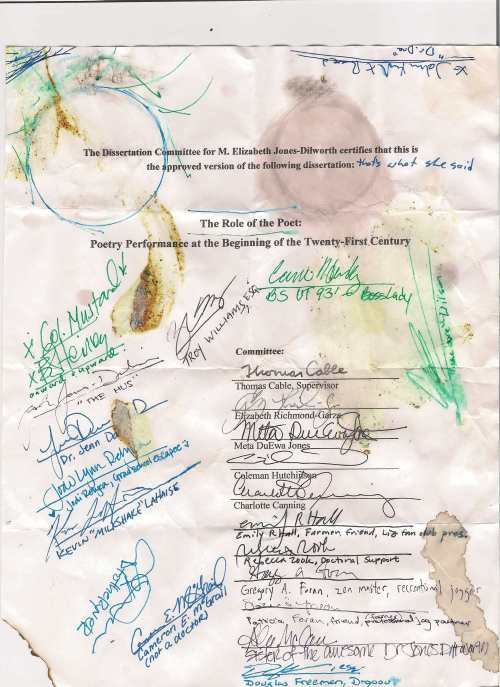Top Posts
RSS
Categories
Conspicuos Consumption
Saturday Morning Breakfast Cereal has a great comic about grad students today. I love how it pokes fun of grad student’s snotty reading habits–one of my favorite grad school pasttimes was shocking fellow students with my poor choices of reading/viewing material.
Posted in Uncategorized
Panel on Productivity
I’m sitting here at SXSW in at a panel entitled “I’m So Productive, I Never Get Anything Done.” It’s probably the worst panel at a conference that I have ever been to. I wish that I tweeted regularly so that I knew how to quickly tweet with the appropriate hashtag and tell everyone at the conference, including the organizers, how much I hate it.
Anyway, what’s making me mad about it is that the people who are on the panel have no information, no research, and no advice. They simply say, “buckle down, don’t let yourself get distracted, and do the work.” Oh, thank you.
If it’s true that these people are great at self-control, then I don’t think that they are the best people to offer advice to those who want to be more productive . . . But wait! Now these supposed experts on self-control are freely admitting that their personal relationships are screwed up because they are constantly distracted by their phones.
Here’s my theory: the people on the panel are not more productive than the people attending it. They are just more confident and more forgiving of themselves. Maybe it would help the people attending the panel to believe that they are productive. Maybe believing it makes it true.
Guest Post on Poetry & Public Culture!
Thanks so much to Mike Chasar, of the excellent Poetry & Popular Culture blog, for inviting me to write a guest post on a LeBron James Nike commercial that doubles as a poem. I had a lot of fun with this. I typically don’t dwell on poetry in this blog, but for those of you who are curious, this is kind of Liz’s Dissertation Lite.
Also, Mike Chasar wrote one of my favorite pieces of poetry criticism EVER, “The Business of Rhyming: Burma-Shave Poetry & Popular Culture.” So you know how happy I am to be on his blog! ;)
Posted in Fun
It’s Really Over Ritual
I didn’t really know what kind of ritual I wanted to do to signify to myself that grad school is really over. Luckily, my husband had the perfect idea. He photocopied the signature page from my dissertation and brought it with us in our post-defense celebrations. He encouraged all our friends to sign it, and also asked that they make the page look “like it has been through hell.” The project was enthusiastically embraced by all, and I have one really fantastic memento of my defense day to show for it. It was a great party, and those signatures not only show how I was supported by friends (and in some cases, people I barely know), but that I’m a doctor now in the eyes of the world! It’s an accepted fact. And I’m pretty psyched about it.
Posted in Defense, Uncategorized
Defense Advice 4: My Defense
I attended three defenses last week, and, as I discussed with some of my colleagues, they are idiosyncratic events. So much of the tone of the defense is controlled by the group dynamic of professors–and those professors do not always behave predictably. Still, there are a few defense strategies that I feel could be useful to others.
I was very nervous, as I believe I mentioned. So I devised a preparation schedule in the couple of weeks before my defense that was non-strenuous, but more productive than simply stewing. I read my dissertation out loud, about 15 pages at a time, in order to catch typos and improve sentence clarity. I knew the committee might give me revisions, but I figured getting the dissertation polished in preparation for its final submission was a good use of time. I also decided to completely finish my reading list for the project. This was unnecessary but not a waste of time. I checked out 20 books from the library, going through most of them in a matter of minutes (they were at the bottom of my list, after all, and most were not helpful), but spending a couple of days on some. My idea was simply to feel confident about my breadth of knowledge.
During my defense week, two of my best friends came in from out of town. They are the kind of friends who did not mind listening to me practice my opening statement three timese. We had a restful day before the defense, which included going to the wildflower center and wandering around a meadow, eating at the vegetarian restaurant where my brother-in-law cooks (chosen for its restful vibe), and going to yoga. Yoga was a *very* good idea. Then Emily gave me a shoulder massage, and Rebecca stood on my thigh bones (a yoga assist said to ground you and help you sleep).
Defense morning, Emily & Rebecca, plus the Future Mister Doctor (oooooh, shit–he’s the Mister Doctor Jones now!) and I got breakfast tacos at my beloved Taco Shack, where the three of them proceeded to give me some warm up questions. I did sort of draw a blank at the first question, so I was glad to have the warm-up. The three of them all took notes during the defense so I didn’t have to worry about that. Afterward, the party was twice as exciting with them there. This strategy would only work, though, with very close friends who are also not stressful (or stressed out by traveling). It’s really important to understand that energy dynamic between yourself and other people before inviting someone into your space during a stressful time.
During the defense, I accidentally happened upon three helpful strategies. First, I found the questions asked interesting. I didn’t consciously try to do that, but I realized afterward that my interest in what was said prevented me from getting defensive in a bad way.
Second, I practiced a bit of selective hearing. The Mister Doctor and my DSG partner Doctor Anderson said that my committee kept trying to draw the conversation into abstract theory land, and I kept answering the questions in the concrete terms of my dissertation. I didn’t mean to do that, but by choosing to answer the part of the question I found most interesting, I also kept the conversation focused on my area of expertise.
Finally, there was one question–or remark, rather, that really pissed me off. Luckily it came at the end when I was feeling confident and relaxed. I thought about ignoring it, but decided to (gently) contradict the professor instead. While none of my committee seemed to find my correction awkward or upsetting, my friends were like, “I’m so glad you stood up for yourself!” And I was too.
Of all the advice I received before the defense, I am most grateful that I asked my advisor directly what he wanted in an opening statement. It was good to get on the same page with that. But secondly, I was grateful for the gossip on committee politics. Thinking about that beforehand helped me instantly understand a very weird moment in my defense. That moment was not bad, but it was all about my professors’ relationships with each other and not about my project. It also helped me come to terms with the way the committee instantly scattered afterward (a function, I believe, of them not knowing each other very well) when I wanted to bask in my moment of glory for a bit longer.
When asked to discuss my project, I have often floundered and felt uncomfortable. I am very proud and happy that I was able to peak at the right time in terms of discussing my project–I had never felt so confident about it. Maybe my idiosyncratic strategies will be helpful to you–or maybe they will inspire you to think of some other strategies better suited to your personality. Either way, I’m glad I devoted time to trying to ensure that grad school ended well. I didn’t have complete control of the situation, so I almost gave up on it–with an “it is what it is” attitude. But I am glad I made the effort to control, if not the situation, at least myself.
Posted in Defense
Defense Advice 3
In my DSG, when Doctor Gale was approaching her defense and feeling a fair amount of fear, The Future Doctor Anderson and I were like, “you don’t need to prepare! Your dissertation is your preparation! You are the expert–you know more about your topic than anyone in the room!” We weren’t just trying to be nice. We honestly couldn’t figure out what her problem was.
I am shocked by how difficult it has been to take my own advice. If the Future Doctor Anderson had not brought up that discussion a few days ago, I wouldn’t have even remembered it. I am basically scared out of my mind.
I am not big on mantras, but before my defense tomorrow, I will be saying, “I am prepared. I am prepared.”
Defense Advice 2
When I sat down with my advisor, who has sat through countless defenses, I was expecting him to launch into a long list of dos and don’ts. But he had relatively little advice to give, which in retrospect, was comforting.
He advised creating a 5-7 minute opening statement that “summarizes your original contributions to scholarship.” I don’t know about the rest of you, but I was imagining something both more complex and more tangential that that. I mean, didn’t everyone just read the dissertation? Surely they know what it was about . . . ? But as I thought about it, it started to make sense–it’s a simple, direct approach to beginning the conversation. Also, summarizing your contribution isn’t exactly like summarizing the dissertation. I realized that I could discuss my methodology, or the significance of the authors I chose. (And not just say, “well, chapter one . . . “)
His only other advice about the opening statement was to say it rather than read it. I agree that reading something could be awkward. But on the other hand, different people have different difficulties at times like this. If your greatest fear is rambling, maybe reading something isn’t the end of the world. But I would suggest more or less detailed outlines, depending on what you are most comfortable with. It seems like memorizing something might be setting yourself up for disaster unless you’re already comfortable with giving memorized talks.
He also said that I should have a plan for what happens to the project next–how I might develop it into a book, or chop it up into articles. He even suggested I think of presses or journals that might be a good fit. At first, I felt really frustrated with this advice–because more than anything, I want to hear what the committee has to say about publication possibilities. I want to take the shortest path to publication. However, my advisor got me thinking that for any question I might want to ask the committee, I should have a partial answer to the question myself. In the defense, you have to perform expertise, so you can’t just bring the committee some problem and say, “I hope you would solve this for me.”
Posted in Defense


